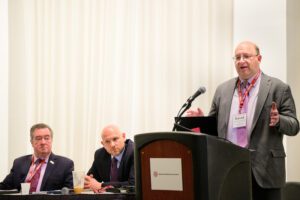Who is a member?
Our members are the local governments of Massachusetts and their elected and appointed leadership.

David Eichenthal, a senior advisor at the U.S. Treasury Department/U.S. Digital Service, right, speaks during the “Unlocking Federal Funds” workshop at the MMA Annual Meeting & Trade Show in January. Workshop panelists also included Frank Callahan, president of the Massachusetts Building Trades Union, left, and Quentin Palfrey, director of the state’s Federal Funds and Infrastructure Office.
The Massachusetts House on Feb. 28 approved a bill designed to leverage interest from the state’s rainy day fund to improve the competitive position of the state and its communities for federal dollars.
The idea was proposed by Gov. Maura Healey in a bill she filed last October. The Senate approved a version of the bill on Jan. 11.
Healey’s bill proposes the creation of a Commonwealth Federal Matching and Debt Reduction Fund to provide a funding source for the state and communities across the Commonwealth to be used to meet the required local match for grants. The proposal would use $750 million in interest generated annually by the state’s stabilization fund.
The bill also proposes $12 million for technical assistance to help municipalities with grant tracking, grant writing and implementation.
The House bill differs from the Senate version, and the differences will need to be reconciled by the two branches.
Additional resources
Obtaining federal aid was the topic of the “Unlocking Federal Funds” workshop held during the MMA Annual Meeting in January, which featured presentations from three key federal funds partners: the Massachusetts Building Trades Unions; the U.S. Department of the Treasury; and the state’s Federal Funds and Infrastructure Office.
The workshop focused on support and resources available to municipalities seeking funding through the Bipartisan Infrastructure Law and the Inflation Reduction Act. Among other topics, presenters explained how labor standards and registered apprenticeships factor into grant applications and administration, and the municipal implications for IRA elective pay.
The new elective payment and transfer options enable state, local and tribal governments to take advantage of certain tax credits even if they don’t have taxable income. The options can be applied to certain clean energy credits under the Inflation Reduction Act.
With only two fiscal years left in the bulk of the Bipartisan Infrastructure Law authorizations, and IRA elective pay registration ready for use, municipalities are advised to act quickly on federal funding opportunities.
The IRS announced in February that municipalities can take the first steps to monetize clean energy tax credits through elective pay. Municipalities are encouraged to register online prior to filing.
Unlike competitive grant and loan programs, in which applicants may not receive an award, elective pay (also known as direct pay) allows entities to get their payments if they meet the requirements for both elective pay and the underlying tax credit. Under the proposed rules, elective pay is available for 12 different tax credits related to energy generation and carbon capture, manufacturing, vehicles and fuels.
An overview of elective pay implications is available in the MMA workshop presentation by David Eichenthal, senior advisor for policy implementation and delivery at the U.S. Department of the Treasury/U.S. Digital Service.
Many projects eligible for Inflation Reduction Act or Bipartisan Infrastructure Law funds can benefit from the use of registered apprenticeships and adhering to particular labor standards. The Massachusetts Building Trades Unions is offering support to municipalities to address such labor standards, with the aim of boosting grant application competitiveness while also developing a skilled, ready workforce to complete the proposed projects.
Local labor partnerships can constitute significant competitive advantages on Bipartisan Infrastructure Law grant applications by adding language into the “Job Creation/Workforce Development Section” of grant applications. The U.S. Department of Transportation Grant Application Checklist for Strong Workforce and Labor Plan and the Department of Energy guidance and webinar on Community Benefits Plans offer helpful information about these competitive advantages. The USDOT also offers examples of projects with strong workforce plans.
Labor standards, including the use of registered apprenticeships, for qualifying projects, will multiply clean energy generation and efficiency subsidies included in the Inflation Reduction Act. By multiplying incentives, communities may save money while also helping to grow local careers. The U.S. Department of Labor provides a Breakdown on IRA Labor standards.
The Massachusetts Building Trades Unions has worked with the city of Brockton to create a Community Workforce Agreement. Such an agreement can be adapted to meet the unique needs of individual communities. For questions and support, contact the local building trades council or Dan McNulty at 508-439-0565 to schedule a meeting.
Federal funds office
The state’s Federal Funds and Infrastructure Office is also available to support municipalities as they consider, apply for and implement various federal funding initiatives. The office is leading the Massachusetts Federal Funds Partnership, which meets monthly to provide helpful information about upcoming grant opportunities and other federal funds topics.
In order to support municipal efforts, the Federal Funds and Infrastructure Office has created a Federal Grant Intake Form for Local Governments for communities to notify the office of in-progress or submitted federal grant applications, as well as projects that could be eligible for federal funding. Additional information for municipalities is available on the office’s website, and questions or requests can be directed to FedFundsInfra@mass.gov.